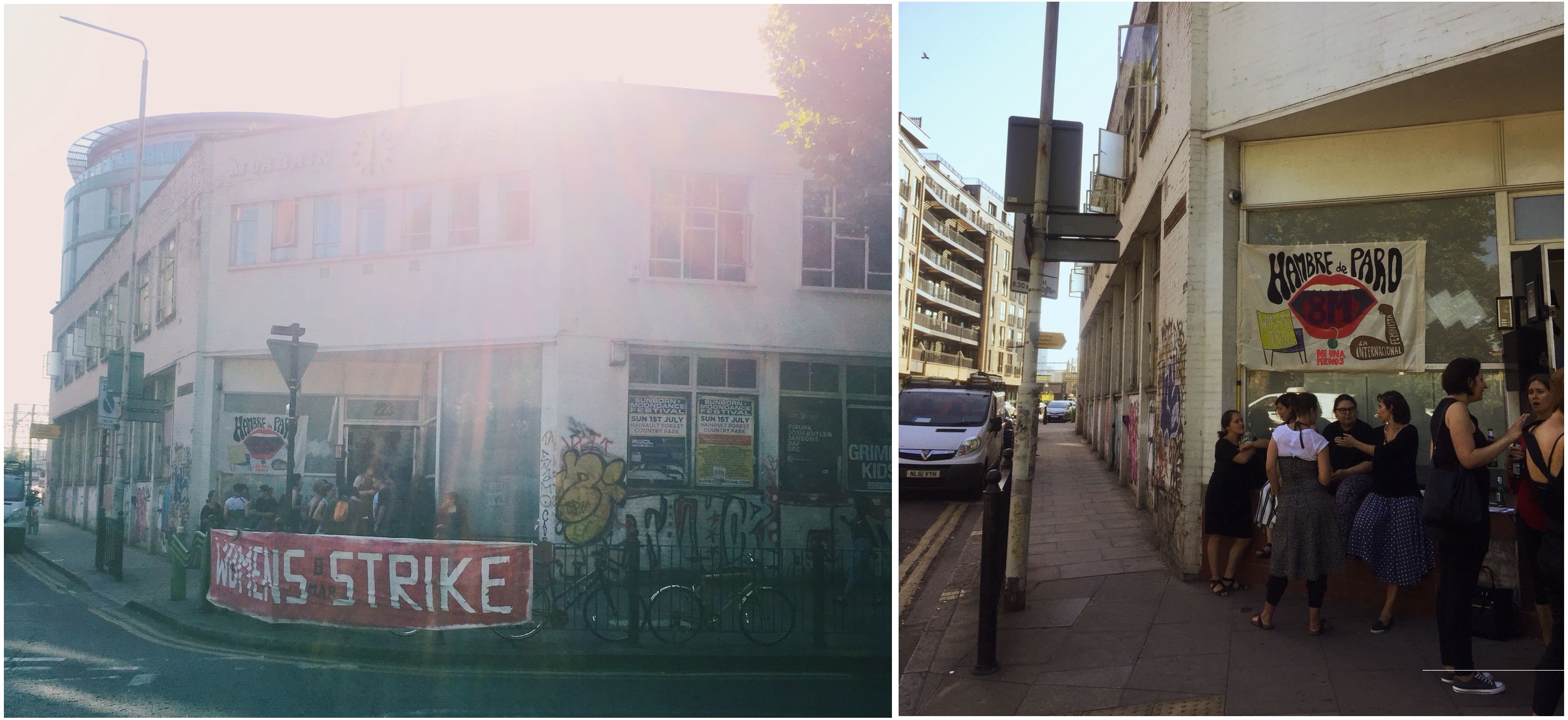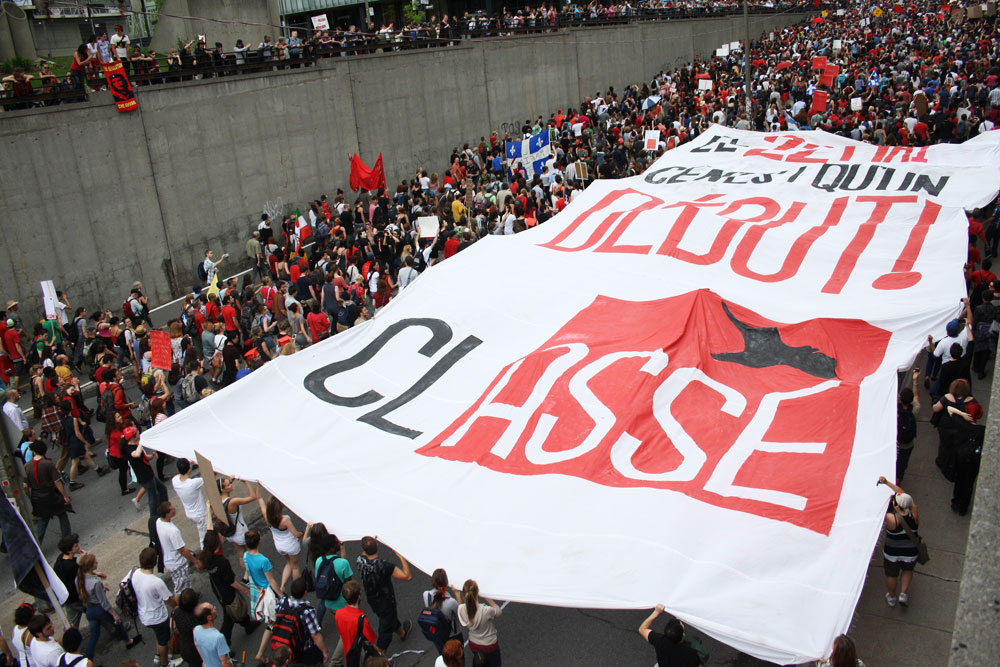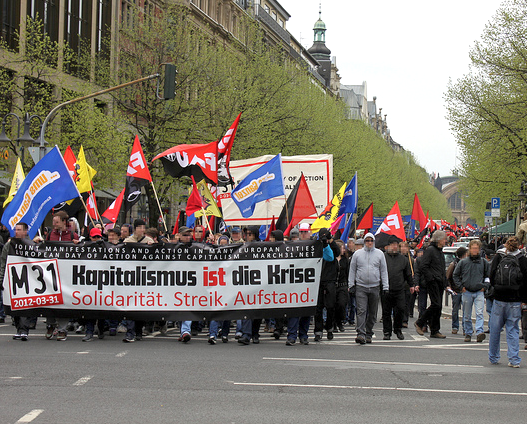“The women’s strike made us protagonists in history.”
On a heatwave evening on a busy street corner in Bethnal Green, the shouts of “Marielle vive” and “Jin, jiyan, azadi” rang out. These chants — the first commemorating Marielle Franco, a black feminist socialist organiser from the Maré favela of Rio de Janeiro who was assassinated earlier this year, and the second echoing the chant of revolutionaries in Rojava — reaffirmed the international solidarity that is central to the emerging global feminist, anti-capitalist movement.
Organisers from the Ni Una Menos movement in Argentina and the UK Women’s Strike came together for an assembly outside of the Campoli Presti Gallery in Bethnal Green, East London, where an exhibition is currently showing material and artwork produced by feminist activists in Argentina. The evening gave an overview of the tidal wave of anti-capitalist feminism sweeping over Latin America, Ireland, Poland, Spain, the US and beyond, demanding not only reproductive freedom and an end to violence against women, but also a revolution for all. This new, fourth wave is a tide of joyous, revolutionary feminism, one moving beyond the confines of previous women’s movements.
Organisers Cecilia Palmeiro and Fernanda Laguna from Ni Una Menos gave a talk on the progress and theory of the movement. Since 2015, Ni Una Menos (‘not one less’) has organised rallies, demonstrations and strikes in Argentina and all over Latin America. It is simultaneously a hashtag, a demand, a rallying cry and a collective. Its specific aim — to end machismo and violence against women — has grown into a powerful demand for a feminist, anti-capitalist revolution.
While Ni Una Menos prioritises the voices of women, the political argument binding together different parts of this mass movement is that machismo, often viewed merely as an overt form of sexism and of the demands of masculinity in a patriarchal society, is in fact a manifestation of the joint and inseparable powers of the state: of capitalism and of the patriarchy. This connection has become obvious during the recent right-wing wave sweeping over much of Latin America. It can be seen in the violent state repression of women’s organising, in the high rates of domestic violence and femicide and in the continued exploitation of women — working class, indigenous, migrant or rural women in particular — in the neoliberal economy.
In Argentina, a woman is killed every 30 hours by a man, usually a current or former partner. According to Ni Una Menos, these violent deaths, often forms of colonial or sexual violence, are seen as “pedagogical” – their aim is to punish women for exercising freedom and to teach women their place in society. The focus of Ni Una Menos is to build a collective subjectivity among all women: to state that when a man commits femicide, he is not a ‘crazy’ outlier, but a logical actor in a patriarchal system — and that for this reason, the death of one woman should be felt by all women. Further, it is necessary to expose the connections between sexual, domestic, colonial and state violence. Drawing from Silvia Federici, Ni Una Menos organisers argue that violence against a women is a powerful tool of capitalist accumulation, enabling the further exploitation of women and the unpaid domestic and care labour we provide.
The slogan ‘nos queremos vivas’ (‘we want ourselves alive’) is not just a demand for an end to femicide but also for a life free of debt, domination and fear of violence. Palmeiro emphasised the importance of seeing the world through a feminist lens — the “purple-tinted glasses” — allowing us to view all political struggle, whether around borders or labour conditions, as a feminist issue. Globally, we can see how budget cuts and austerity hit women hardest. The unpaid domestic labour and care labour predominantly performed by women keeps capitalist societies functioning, and this burden of care grows further as services are cut. The purpose of the women’s strike is to make this labour visible and to directly intervene with capitalist production by showing women that our bodies function as factories of reproductive labour — it is within our power to shut them down.
Both Ni Una Menos and the UK Women’s Strike are involved in constructing utopias that draw from the example of Rojava and seek to construct a new vision of a red feminist horizon. Turning away from the third-wave feminist concerns over women in boardrooms, and from organising tactics that merely ask the state for protection under law, this new tidal wave seeks to dismantle the capitalist and state structures that oppress us all and that disregard the lives of women. These utopian politics coexist with organising over more immediate concerns: Ni Una Menos has been instrumental in pushing for legalising abortion in Argentina, while the UK Women’s Strike is campaigning to decriminalise sex work.
As a social movement, Ni Una Menos calls for a new kind of internationalism, based on empathy — as Cecilia put it, “We can all recognise our oppression as having the same source, despite the differences in our circumstances.” Camille Barbagallo from the Women’s Strike ended the evening by stating that feminist movements in the West need to catch up with the rest of the world: the time for feminist movements seeking to “save” the women of the Global South is definitively over. The meeting came to a close with statements of solidarity with the women of Rojava, and a chant of “Jin, jiyan, azadi” — woman, life, freedom.



